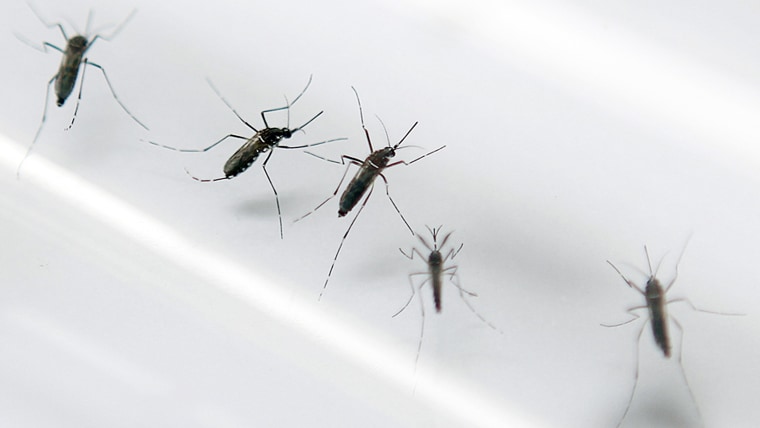Colombian officials predict the fast-spreading Zika virus may infect as many as 700,000 people there, and they're advising women to put off getting pregnant if they can.
Brazil has reported several hundred more cases of a birth defect called microcephaly, in which babies have underdeveloped heads and brains and often die before or at birth. More than 3,800 cases have been reported in the past year.
Guyana, Barbados and Ecuador joined the list of countries that now have the virus spreading locally, and pregnant women are being advised to cancel trips to affected countries if they can. El Salvador advised women to delay pregnancy for two years until the virus settles down.
A travel alert has been issued by the Centers for Disease Control and Prevention for these countries (list is subject to change):
- Puerto Rico
- Brazil
- Barbados
- Bolivia
- Ecuador
- Guadeloupe
- Saint Martin
- Guyana
- Colombia
- El Salvador
- French Guiana
- Guatemala
- Haiti
- Honduras
- Martinique
- Mexico
- Panama
- Paraguay
- Cape Verde
- Samoa
- Suriname
- Venezuela
The CDC says doctors should ask all pregnant women if they’ve been to affected areas, and get them tested for Zika if they have traveled and also show symptoms.

What CDC doesn’t say directly is that there’s really nothing to be done for a pregnant woman who’s infected with Zika. There’s a long list of unanswered questions about the virus:
Does it really cause birth defects?
Zika first popped up in east Africa in 1952 and doesn’t even cause symptoms in 80 percent of people it infects. Since then it’s circulated under the radar, spreading slowly to tropical regions, before taking off and spreading fast and furious across South America last year, carried by Aedes aegypti mosquitoes. No one ever reported an uptick in birth defects before from Zika, but that could be because no one was looking.
But there are some strong hints. Genetic material from the virus has been found in the bodies of babies with microcephaly that miscarried and in babies born with microcephaly – but just a few. It's possible something else caused the defect but because Zika's so common now in Brazil it has also turned up in babies. No other country besides Brazil has reported an increase in birth defects yet.
Do you have to have symptoms for it to affect your baby?
That’s not clear, either. Most cases are asymptomatic – people don’t even get a fever. Even the worst cases are mild, with a rash, fever, muscle aches and pinkeye.
Is it certain to cause a birth defect if you have it?
Since it’s not clear if the virus even causes microcephaly, it’s not at all clear what the risks are to a pregnant woman or her baby.
Is there an especially dangerous time in pregnancy?
That’s also not clear, although brain development occurs throughout pregnancy. Microcephaly usually is not visible until the second trimester.
Could something else besides Zika be causing the increase in birth defects?
It’s possible.
Microcephaly can be caused by several viruses, including rubella; by poor nutrition; by alcohol or drug use. In addition, Zika’s a relative of dengue, another virus spread by mosquitoes and very common in Brazil. Dengue comes in four strains and its worst effects come after a person gets infected with more than one strain.
It is plausible that Zika may have worse effects in people who have been infected with dengue or another virus before. Or it may be worse in people who are malnourished.
In both French Polynesia in 2013 and in Brazil last year, both Zika and dengue were circulating at the same time and officials noticed an increase in cases of Guillain-Barré syndrome, a neurological disorder that can follow viral infections.
El Salvador has reported an increase in the number of Guillain-Barre cases, the World Health Organization says.
When will we know?
Answers could take months. Human pregnancies last nine months and researchers will need to study more than a handful of people to see any kind of clear pattern.
Will Zika spread more?
Almost certainly. The mosquitoes that carry Zika are found throughout the Americas, as far north as the southern part of the U.S. As more people become newly infected, mosquitoes that bite them will be more likely to pick up the virus and spread it to other people. The two conditions that are needed for spread are groups of currently infected people and populations of Aedes mosquitoes. People who have recovered from an infection cannot spread the virus to mosquitoes and people don't infect other people, with the rare possibility that men may sometimes transmit it in sperm.